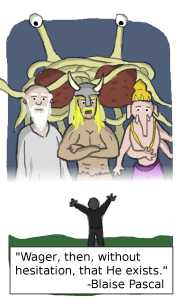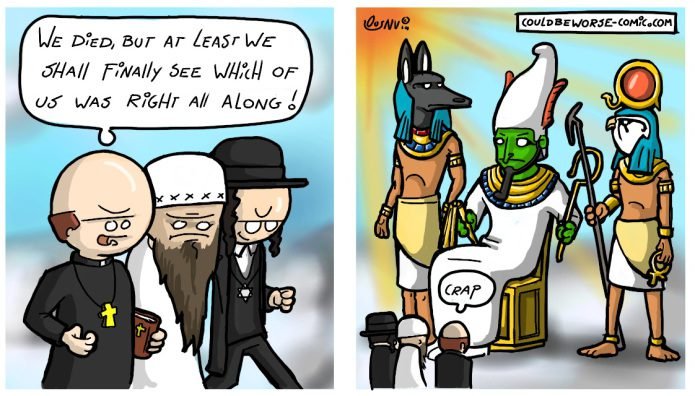
It’s been years since I have had an Evangelical Christian ask me a question I haven’t heard and answered before. But, Evangelicals keep asking, so I will keep answering. Perhaps, “in the year 7510 — if God is going to make it, he ought to make it by then” — Evangelicals will discover and use Google search or the search function of this blog. (Please see Curiosity, A Missing Evangelical Trait.) Until then, I will patiently answer their questions.
Today’s interlocutor is a Canadian Evangelical named Anna. Anna read two posts:
Anna then sent me an email that said:
What if you are wrong? Then what happens.
Do you believe in right and wrong? Good and bad?
Question Number One: What if you are wrong? Then what happens?
Wrong about what, exactly? There’s so many things that I could be right or wrong about, so what is it that Anna thinks I am wrong about? I think I can safely guess the she thinks am I wrong about God/Jesus/Christianity/The Bible/The Reds making the playoffs. And, if I am wrong about Jesus, why I will spend eternity in the Lake of Fire being tortured day and night for my refusal to buy what Christians are selling.
However, I am not wrong. While I am agnostic on the God question — an as-yet-unknown deity could exist and reveal itself someday — I am confident that Christianity and its two sisters, Judaism and Islam, are nothing more than ancient tribal religions that can rationally be ignored. I am also confident that the Protestant Christian Bible is a collection of myths and fables; that Jesus was a mere man who lived and died in Palestine 2,000 years ago; that the central claims of Christianity do not make sense. (Please see The Michael Mock Rule: It Just Doesn’t Make Sense.)
I would ask Anna, what if YOU are wrong? How do you empirically know that the triune Christian deity is the one true God? How do you know the central claims of Christianity are true? How do you know the Bible is an inspired, inerrant, infallible book? What evidence do you have for these claims. Why is Christianity true, and not Islam? Why is Christianity true, and not Buddhism? Why is Christianity true, and not Mormonism? Why is Christianity true, and not Paganism? Why is . . . well, you get my point. Have you thoroughly investigated these other religions?
If anything, Anna should be practicing a new rule I am introducing tonight, “The Edgar Rule.” Edgar was a banker at the financial institution where the church I pastored at the time — Somerset Baptist Church — did business. Edgar was a delightful man to work with, a talker, as was I. The church I pastored did a lot of loan business with Edgar’s bank over the 11 years I pastored the church — from short-term loans to car loans to our mortgage.
One day, I was talking with Edgar about getting a short-term loan. Edgar said:
Bruce, you would be shocked to know how much money some of the local churches have on deposit. I like to loan money to churches, covering all my bases, ya know.
And then, he laughed.
“Covering All Your Bases.” That’s the “Edgar Rule.” You see, shouldn’t this be the default position for those who pose the question, “what if you are wrong?” question. Isn’t in their best interest to be a BaptoCathoPentoMusolBuddo universalist?
Remember, almost every religion believes in Hell, annihilation, or some sort of temporary/permanent punishment for non-believers. Shouldn’t Anne and her fellow Evangelicals fear being wrong and ending up in a different religion’s Hell?
I don’t worry in the least that I am wrong about the Christian God/Jesus. I have weighed this religion and its deity in the balance and found it wanting. I gladly await any new evidence that might be provided to disabuse me of my atheist/humanist beliefs, but so far, all I have received are tire, worn-out, stale, irrational arguments.
Question Number Two: Do You Believe in Right or Wrong? Good and Bad?
Again, Anne’s question lacks specificity, so I am left to guess her meaning. I suspect she wants to know if I believe in Biblical morality? The short answer is no. While the Bible does have some good moral and ethical values, it also has a number of reprehensible and immoral teachings. It is not a book that can be in any way relied upon as an objective, absolute standard of morality. Only those who read the Bible with rose-colored glasses can suggest otherwise.
Do I have moral and ethical beliefs? Yes. Four beliefs come to mind:
- Love your fellow man
- Do good to others
- Stand up for the weak, powerless, and disenfranchised
- Don’t be an asshole
I believe it is morally wrong to murder, rape, molest children, destroy the property of others, vote for Donald Trump, and drink Bud-Light.
I also believe than morality is inherently subjective; that it changes over time; that it is culturally, socially, and religiously influenced.
Further, I have concluded that some of the behaviors considered immoral by Evangelicals, aren’t. For example, I don’t think premarital sex, extramarital sex, homosexuality, transgenderism, divorce, wearing polyester shirts, eating shrimp, women wearing pants, men wearing skirts, long hair on men, short hair on women, and eating at Taco Bell — all sins condemned by the Bible — are morally wrong. Well, except eating at Taco Bell. Talk about killing one’s self, one crunchy taco and soft burrito at a time.
Fundamentally, it is humanism that best explains my morality. The Humanist Manifesto III states:
Humanism is a progressive philosophy of life that, without supernaturalism, affirms our ability and responsibility to lead ethical lives of personal fulfillment that aspire to the greater good of humanity.
The lifestance of Humanism—guided by reason, inspired by compassion, and informed by experience—encourages us to live life well and fully. It evolved through the ages and continues to develop through the efforts of thoughtful people who recognize that values and ideals, however carefully wrought, are subject to change as our knowledge and understandings advance.
This document is part of an ongoing effort to manifest in clear and positive terms the conceptual boundaries of Humanism, not what we must believe but a consensus of what we do believe. It is in this sense that we affirm the following:
Knowledge of the world is derived by observation, experimentation, and rational analysis. Humanists find that science is the best method for determining this knowledge as well as for solving problems and developing beneficial technologies. We also recognize the value of new departures in thought, the arts, and inner experience—each subject to analysis by critical intelligence.
Humans are an integral part of nature, the result of unguided evolutionary change. Humanists recognize nature as self-existing. We accept our life as all and enough, distinguishing things as they are from things as we might wish or imagine them to be. We welcome the challenges of the future, and are drawn to and undaunted by the yet to be known.
Ethical values are derived from human need and interest as tested by experience. Humanists ground values in human welfare shaped by human circumstances, interests, and concerns and extended to the global ecosystem and beyond. We are committed to treating each person as having inherent worth and dignity, and to making informed choices in a context of freedom consonant with responsibility.
Life’s fulfillment emerges from individual participation in the service of humane ideals. We aim for our fullest possible development and animate our lives with a deep sense of purpose, finding wonder and awe in the joys and beauties of human existence, its challenges and tragedies, and even in the inevitability and finality of death. Humanists rely on the rich heritage of human culture and the lifestance of Humanism to provide comfort in times of want and encouragement in times of plenty.
Humans are social by nature and find meaning in relationships. Humanists long for and strive toward a world of mutual care and concern, free of cruelty and its consequences, where differences are resolved cooperatively without resorting to violence. The joining of individuality with interdependence enriches our lives, encourages us to enrich the lives of others, and inspires hope of attaining peace, justice, and opportunity for all.
Working to benefit society maximizes individual happiness. Progressive cultures have worked to free humanity from the brutalities of mere survival and to reduce suffering, improve society, and develop global community. We seek to minimize the inequities of circumstance and ability, and we support a just distribution of nature’s resources and the fruits of human effort so that as many as possible can enjoy a good life.
Humanists are concerned for the well being of all, are committed to diversity, and respect those of differing yet humane views. We work to uphold the equal enjoyment of human rights and civil liberties in an open, secular society and maintain it is a civic duty to participate in the democratic process and a planetary duty to protect nature’s integrity, diversity, and beauty in a secure, sustainable manner.
Thus engaged in the flow of life, we aspire to this vision with the informed conviction that humanity has the ability to progress toward its highest ideals. The responsibility for our lives and the kind of world in which we live is ours and ours alone.
I hope my answers adequately answer Anne’s questions. If Anne reads this post — and I will make her aware of its existence — I hope she will practice Matthew 7:7, seek and ye shall find. I have written almost 4,000 posts on this site. I also have a page, Why? that lists numerous posts for people who have questions about my deconversion to read. To quote Fox Mulder:

Bruce Gerencser, 68, lives in rural Northwest Ohio with his wife of 47 years. He and his wife have six grown children and sixteen grandchildren. Bruce pastored Evangelical churches for twenty-five years in Ohio, Texas, and Michigan. Bruce left the ministry in 2005, and in 2008 he left Christianity. Bruce is now a humanist and an atheist.
Your comments are welcome and appreciated. All first-time comments are moderated. Please read the commenting rules before commenting.
You can email Bruce via the Contact Form.





